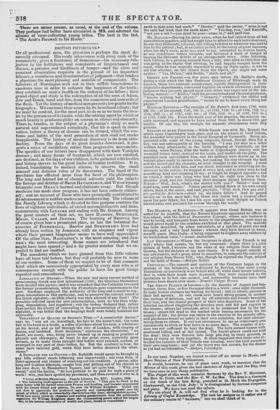THE MASTIVE, Or BANDEDOG.—It appears that Great Britain was SO
noted for its mastiffs, that the Roman Emperors appointed an officer in this island, with the title of Procurator Cynegii, whose sole business it was to breed, and transmit from hence to the amphitheatre, such dogs as would prove equal to the combats exhibited at that' place. The mastiffe has been described, by other naturalists, as a species of great size and strength, and a very loud barker ; whence they have derived its name, mastiff, quasi, blase thefts; it being supposed to frighten away robbers by its tremendous voice."—Icons Animalium.
LAY CIannanoxv.—Where the Scripture is silent, the Church is my text ; where that speaks, 'tis but my comment : where there is a joint
silence of both,1 borrow not the rules of my religion from Rome or Geneva, but the dictates of my own reason. It is an unjust scandal of our adversaries, and a gross error in ourselves, to compute the nativity of our religion from Henry VIII., who, though he rejected the Pope, refused not the faith of Rome.—Religzo Medici.
CENTAURS.—The conceit and opinion of the Centaurs began in the mistake of the beholders, as is declared by Servius, when some young Thessalians on horseback were beheld afar off, while their horses watered, that is, while their heads were depressed, they were conceived by the spectators to be but one animal, and answerable hereunto have their pictures been drawn ever since.—Brown's Vulgar Errors.
THE GREAT PLAGUE IN LONDON.—In the months of August and Sep. tember, three, four, or five thousand died in a week : once eight thousand.
In some houses carcases lay waiting for burial ; and in others, persons in their last agonies. In one room, were heard dying groans, in another the ravings of delirium, and not far off relations and friends bewailing
their loss, and the dismal prospect of their own departure. Some of the infected ran about staggering like drunken men, and fell and expired in the streets ; others lay comatose, never to be awakened but by the last trump ; others fell dead in the market while buying necessaries for the support of life; the divine was taken in the exercise of his priestly office, and physicians found no safety in their own antidotes, but died adminis- tering them to others. It was not uncommon to see an inheritance pass successively to three or four heirs in as many days. The number of sex- tons was not sufficient to bury the dead. The bells seemed hoarse with continued tolling, and at last ceased.. The burial-places could not hold the dead : they were thrown into large pits dug in waste grounds, in heaps of thirty or forty together. It often happened that those who at- tended the funerals of their friends one evening, were the next carried to their own long home; and yet the worst was not certain, for the disease as yet had no relaration."—Hodges, Loimologia.


























 Previous page
Previous page